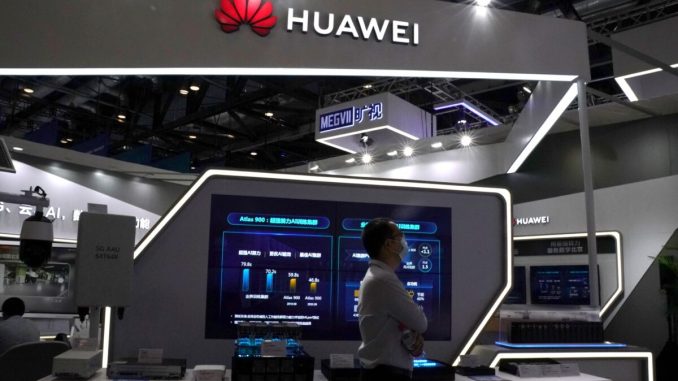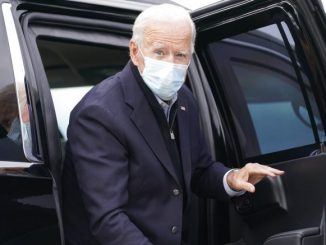
Commentary
Despite the obvious danger of espionage from Chinese telecommunications companies such as Huawei, the Global South is eagerly signing up for its e-government and cloud infrastructure services. Most of the 70 deals identified by a new Center for Strategic and International Studies (CSIS) report are from countries in Asia, Sub-Saharan Africa, and Latin America. The deals, which started as early as 2006, were found in 41 countries, most considered “partly free” or “not free” by Freedom House. The new study, produced by Jonathan Hillman and Maesea McCalpin at CSIS, was reported in the Financial Times.
International Huawei deals are getting inked despite warnings from the U.S. government of Huawei’s electronic espionage, and extensive evidence of Huawei’s influence operations around the world, including in the United States. Huawei spent almost $3 million on lobbying in the United States in 2019, and is close to senior former politicians in both the United States and Canada. That year, news broke that the company hired a former Obama National Security Council senior director for cybersecurity policy to do its lobbying in Washington.
In 2018, China’s telecommunications company ZTE hired Joe Lieberman, the Democratic Party’s Vice-Presidential candidate in the 2000 elections. ZTE “has retained the lobbying services of two other former lawmakers, former Minnesota Sen. Norm Coleman and former Nebraska Rep. Jon Christensen,” according to Politico. “Bryan Lanza, a former deputy communications director for the Trump campaign, also did work for ZTE earlier this year through Mercury Public Affairs.”
According to unpublished evidence shown to me yesterday by a Canadian academic, Huawei is close to a string of influential Canadians. Three former Canadian prime ministers, and three former foreign ministers, are linked to soft-on-China views and Chinese finances, according to the academic’s research, which he is currently withholding due to concerns over frivolous lawsuits. We need better legislation to protect journalists and academics if we want to expose China’s corrupting influence in our democracies.
That legislation is lacking, in part because our legislators partake in such corruption. So, it’s no wonder that China treats our democratically-elected politicians like placemats. That’s what their continual striving for campaign donations and post-official consulting gigs has made of them. Former British Prime Minister David Cameron is the latest to undergo public humiliation for his various lobbying failures, including a doomed attempt to promote a $1 billion China investment fund.
According to the apparently understated CSIS report (CSIS has its own China-linked donors), “As Huawei carves out a niche as a provider to governments and state-owned enterprises, it is building a strategic position that could provide Chinese authorities with valuable intelligence and even coercive leverage.” In other words, if Huawei records a Prime Minister taking kickbacks for an oil deal, cheating on his wife, or buying cocaine, Huawei can use such moral failings as “coercive leverage” to force the Prime Minister to do China’s bidding.
Our think tanks better start speaking more clearly and quickly, or they, with the rest of us, will go under. Think tanks should make a public pledge not to take money from China-linked sources, including U.S. and European corporations that depend on China for their profits. If that means a bit less glass and concrete to their names, so be it. I’d rather have unbiased analysis than a fancy marquee. Meanwhile, beware their bland soporifics.
Huawei’s influence extends to the world’s most prestigious universities, including MIT, which has done about $11 million worth of deals, including donations and for research, with the Chinese company since 2013, and Cornell, which inked $1 million worth of deals.
Oxford only put a ban on Huawei donations and research in early 2019. At the time, Huawei contracts only amounted to £692,000. Who knows how much money had already flowed. By September 2019, China-linked billionaire Stephen Schwarzman had donated £150 million to the university.

Most prestigious universities cut Huawei projects a year earlier, in 2018. Many of Huawei’s projects with the universities dealt in sensitive technologies, like semiconductors, robotics, and online cloud services.
The data center produced by Huawei in Papua New Guinea included serious vulnerabilities to hacking. A 2012 Huawei communications contract for the African Union headquarters in Addis Ababa resulted in the organization’s officials accusing China of nightly hacking its computer systems for five years in order to download confidential data. Of course, Huawei denies owning customer data. But that’s an obvious untruth, unless they want to argue that “stealing” isn’t really “owning.” Right.
The United States claims that Huawei utilizes back doors in its equipment to help the Chinese government spy on data that traverses its equipment. We rightly sanction the company by restricting its purchase of semiconductors and other critical technologies. Huawei nevertheless produces more telecommunications equipment for the global market, than any other company. All of this is the tip of the Chinese influence iceberg, and it’s about to sink our ship of state.
As we can feel the water fill our shoes, let’s be honest. Countries spy. That’s what they do. The United States allegedly spied on 35 world leaders, including European Union officials, and German Chancellor Angela Merkel. Add to that a U.S. National Security Agency (NSA) breach of 70 million telephone records of French citizens in one 30-day period. That was in 2013. President Obama apologized and said he would stop. Yeah right.
When the government promises to quit spying, it just keeps on going. That’s what governments do.
China doesn’t acknowledge its spying, and doesn’t apologize. But it certainly spies on anyone available of importance. And, companies like Huawei that are based in China will be unable to contravene any orders they get from the Chinese government. That’s the law in China.
According to Christopher Wray during his tenure as President Trump’s FBI Director, “It is public record that under Chinese cybersecurity law, Chinese companies like Huawei are required to provide, essentially, access upon demand with little to no process to challenge that. And so that’s why it creates the national security implications we are concerned about.”
Knowing that countries spy on allies, and that such spying is a powerful tool of statecraft, one cannot realistically expect countries in geopolitical competition like the United States and China to stop spying. The more realistic approach is to assume that any country that can spy, will spy, and to ensure (to the best of our abilities) that the worst countries in terms of values, like China, are not given the electronic keys to the kingdom.
Choose the lesser of two, three, or 193 (the number of countries in the U.N.) evils. Instead of buying cheap Huawei gear used to threaten democracies globally, buy Nokia or Ericsson gear from Finland and Sweden. Those countries tend to support freedom, democracy and human rights more than the others. So at least their spying might be used for good. If you think the United States is the only country militarily and economically powerful enough to stand up to China, empower this champion of democracies by buying gear from American companies too. I’ve been on the inside and trust America more than China. You should too.
Anders Corr has a BA/MA in political science from Yale University (2001) and a Ph.D. in government from Harvard University (2008). He is a Principal at Corr Analytics Inc., Publisher of the Journal of Political Risk, and has conducted extensive research in North America, Europe, and Asia. He authored “The Concentration of Power” (forthcoming 2021) and “No Trespassing,” and edited “Great Powers, Grand Strategies.”
Views expressed in this article are the opinions of the author and do not necessarily reflect the views of The Epoch Times.





Be the first to comment